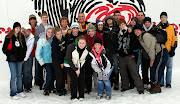 From the Daily Mail in London:
From the Daily Mail in London:The Pope has addressed the economic gloom in his Christmas message.
Benedict XVI warned that the world was headed toward ruin if selfishness prevails over solidarity during tough times for both rich and poor nations.
'If people look only to their own interests, our world will certainly fall apart.'
This got me to thinking, is selfishness prevailing in this world?
The easy, however unsettling, answer is yes. Selfishness appears to be a cross-cultural phenomenon that binds us together as human beings with something to horde. Selfishness is a luxury, one that we all partake in.
When I think of communities, at least those in the strict sense, I am reminded of how many people in this world live in squalor without the ability to even think in self-maximizing terms. What would this world look like if we thought more like them? What if we didn't perceive our relationships as simply transactions between unequals? Would selfishness still prevail?
Some harsh realities
Eight out of every 10 people in this world live on less than 10 bucks per day. I recently spent 30 bucks on some DVDs. Is selfishness prevailing?
It is only by necessity that human beings are being forced to depend on one another more, and we know what happens in times of plenty. It was just three years ago that the World Bank released this disturbing news: 80 percent of people on this planet live in countries with widening income disparities. Is selfishness prevailing?
An estimated 800,000 children, just children, die every year as a result of malaria alone. There is a long list of preventable diseases that further cut short the lives of children in underdeveloped nations. What if 800,000 children died in one year as a result of diarrhoea in North America? What if hundreds of thousands of children were dying because they lacked access to immnunzation? How would we react? Is selfishness prevailing?
In the United States we use, on average, 600 liters of water per day. 1.8 billion people who have access to a water source within one kilometer consume around 20 liters per day. 12 percent of the world's population uses 85 percent of its water. Could we survive on less? Do we even think in those terms? Is selfishness prevailing?
The World Bank recently released its 2005 numbers regarding private consumption. Did you know that the richest 20 percent of the world account for 77 percent of private consumption? Is there something inherently wrong with that? Is selfishness prevailing?
Did you know that every time your power goes out you become a kindred spirit to roughly 1.6 billion people who do not have electricity now or ever? Is selfish prevailing?
The next time you feel yourself being flippant about opportunities, consider that one percent of the adults on this planet have had the opportunity to go to a four-year college. Do I really ponder not having enough education? Is selfishness prevailing?
These are the best-laid plans?
At the turn of the 21st century, leaders from nearly 200 countries (the United States chief among them) came together to discuss ways to end to extreme poverty (among other global crises), and even staked themselves to timetables. The sad reality, of course, some eight years later, is that many of the aforementioned countries are failing to meet the UN's development goals. Why? Because extreme poverty in underdeveloped countries is not a priority to the richest countries in the world.
Take China out of the equation, and our world's recent record of reducing poverty isn't much to look at. The west has something to be gained from a Chinese middle class, of course. Progress, in this way, is still marred by selfishness.
Grandiose national and global priorities are merely reflections of the personal. If selfishness truly does prevail, it will do so because we've allowed ourselves--at the most basic level--to believe the lies about a hierarchy of humanity. We will have allowed selfishness to prevail.
All that to say this: 'If people look only to their own interests, our world will certainly fall apart.'
And to my Christian friends out there, this: What you have is not your own.










.jpg)








